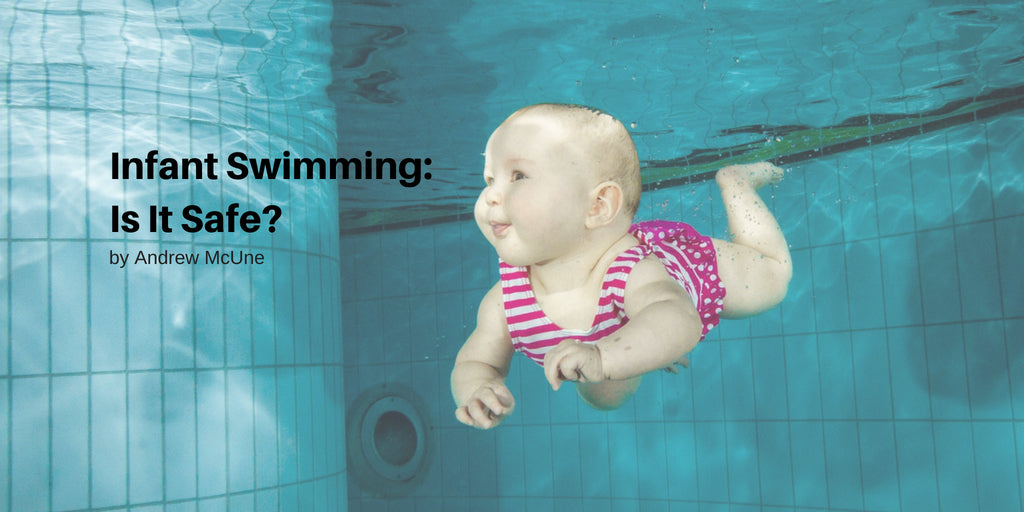As with all things parenting, the question of whether to take infants swimming is filled with controversy. Opinions on baby swimming lessons are many and varied. Here, we take a look at some accredited studies and expert opinions to shed some light on the subject. The scientific studies we reference here primarily examine children aged 1-4 years; most of our discussion will be on the early side of that range.

The Cons
Environmental Hazards
When chlorine mixes with, ahem, certain organic substances, it creates a compound called trichloramine. Trichloramine is associated with eye and skin irritation, that lingering chlorine smell, and increased risk of asthma and other respiratory illnesses. With indoor pools in particular, this compound accumulates in the air as a gas.
A Belgian study published in 2006 and discussed here found that children who took part in a baby swimming program before the age of two were at higher risk of developing asthma and respiratory allergies. Dr. Richard Lichenstein, cited here, expressed these concerns about the effects of swimming pools on infants:
Infants can become hypothermic from exposure, get water intoxication from swallowing water and develop gastrointestinal and skin infections. There are risks associated with infant swimming.
Infants Lack Skills
In a rather compelling video, Dr. Julie Silver of Harvard Medical School comes down strongly in the negative column. The first reason she cites is that infants just aren’t ready for it, physically or mentally.
Your infant isn’t developmentally ready [for infant swim classes]. Your baby can’t follow the directions and doesn’t have the necessary strength and coordination to swim until about age 4.
Drowning
Another major concern about infant swimming classes is the risk of parental complacency. Several experts, including the Drs. Silver and Lichenstein already referred to, express concern that by taking their infants to swimming classes, parents may assume that their infants and very young children are then safe from drowning. Their conclusion is that this could make parents less attentive and put their children at greater risk of drowning.
The Pros
Decreased Risk of Drowning
The good news is that a 2009 case control study showed that formal swimming lessons were associated with significantly decreased drowning risk, even in that young one- to four-year old range. Some theorize that by participating in formal swimming classes with their infants, parents’ awareness of drowning risks actually increases, making parents more attentive and careful when their young children are around water.
Benefits for Baby Brains
Babies may benefit developmentally from the effects of swimming. An Australian study found “that swimming truly does provide added capital to children’s lives by helping them socially, physically, cognitively and emotionally.”
The Healthline article that discusses the Australian study states:
Cross-patterning movements build neurons throughout the brain, but especially in the corpus callosum, which facilitates communication, feedback, and modulation from one side of the brain to another. Down the road, this improves:
- reading skills
- language development
- academic learning
- spatial awareness
When swimming, your baby moves their arms while kicking their legs. And your cutie is doing these actions in water, which means their brain is registering the tactile sensation of water plus its resistance. Swimming is also a unique social experience, which furthers its brain-boosting power.
Some Pools are Healthier than Others
A chlorinated pool’s negative effects, which we discussed above, are pretty well documented. But the effects can be mitigated by being careful about the type of pool where you take your infant.
Dr. Silver discussed how some pools are better than others in those regards. An outdoor pool, she says, is better than an indoor pool, and indoor pools should be equipped with good ventilation.
Are Classes Right For Your Baby?
There’s another question involved in the type of swimming your infant engages in. An extreme form of infant swimming lessons is called Infant Self-Rescue, which you can read about here. In these classes, infants are repeatedly immersed in the water, and there are horrific videos of babies crying, screaming, and gulping water. Opponents of this type of infant swimming lessons call it child abuse. Some parents claim their children become more competent and confident in the water because of the classes.
Done correctly in a healthful environment and with proper care and attention, infant swimming classes can be healthy, improve your child's safety and your own awareness, and benefit your child developmentally.
On a personal note, the co-author of this post, Angeli, participated in Mommy-and-Me swimming classes with her children. The greatest advantage, she said, was her own education. “I got to watch how my kids reacted to the water, and, as I taught them safety skills, I learned how to enforce them. Our pool was well-ventilated, and I was careful to bathe the kids thoroughly after each class. Overall, I think it was an extremely positive experience for me and my kids.”





Leave a comment
All comments are moderated before being published.
This site is protected by hCaptcha and the hCaptcha Privacy Policy and Terms of Service apply.